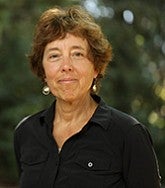
History
Courses: HIST 608: Modern United States History and Historiography
In my courses you will:
- Learn with and from peers.
- Interact during exciting, participatory class meetings.
- Understand what it means to be at a research university with the chance to gain new knowledge.
I was invited into the Teaching Academy because:
- I was a member of the Working Group on Active Teaching and Learning.
In what ways are you working to make your teaching inclusive?
This graduate course seeks to expose students to recent, innovative work in a wide range of subfields in modern U.S. history. By including new scholarship from immigration history, labor history, and the history of sexuality, to mention only three examples, I aim to reach students whose interests are diverse. One student in the course may be extremely interested in disability history but not at all interested in the history of U.S. foreign policy, for examplewhile others respond very differently. I also make an effort to change many of the fields I cover—as well as all of the reading—each time I teach the course.
What do you do in terms of professional engagement with the teaching and learning culture on campus or nationally?
I admire the work that TEP has done to make excellent teaching visible on our campus and advance our university's commitment to steady improvement in this area. I have benefited from its programs, including the Summer Institute and various workshops.
In what ways was your teaching in this course research-led—informed by research on how students learn and inflected by UO's research mission?
In HIST 608, I arrange for students to have weekly conversations with the authors of the books and articles they are reading. Because one of my goals is to demystify the process of conducting research, writing, and navigating the steps of academic publication, I aim to have students read at least one book that is still in manuscript form, nearing completion but not yet finished. Almost all of the authorse conversations take place remotely, via two-way videoconferencing. This is one area where I have found classroom technology to be enormously beneficial in creating new types of educational experiences that were never available when I was a graduate student. The first part of this weekly class (usually 60-90 minutes) consists of direct engagement with authors. The authors talk about the research process that resulted in the published scholarship my students read and the students ask a wide range of questions about that work, the subfields of interest to the authors, and their his or her current and future projects. During the second part of class (90 minutes), the students and I carry on the discussion by ourselves. Organizing the class this way is extremely interesting and valuable for the students and makes the important point that excellent historical scholarship is not only the product of individual intelligence and hard work but of communities in which scholars debate and exchange ideas. The course is itself a mini-example of how that works.
Who or what led you to this discipline?
I took a course on Victorian science when I was a freshman in college. I had absolutely no interest in history at the time—I thought I would be an English major—but I did want to take a class with one particular friend and this was the one that fit into both of our schedules. That class and its professor (Cynthia Russett) changed everything for me.
What is your proudest professional achievement?
My proudest professional accomplishment was not something I wrote or published on my own. Starting in 2008, I participated in an effort to bring insights from current historical scholarship to bear on the state-level same-sex marriage cases that were making their way through the federal circuit courts. I worked collaboratively with approximately 20 other scholars to write amicus briefs for these cases. Our work culminated in 2015, when the Obergefell case was heard by the U.S. Supreme Court. The brief we filed in that case was cited in Anthony Kennedy’s majority opinion guaranteeing marriage equality under the U.S. Constitution. I consider it a privilege to have made a small contribution to this historic achievement and believe that our work illustrates the potential to bridge the worlds of academia and advocacy.
